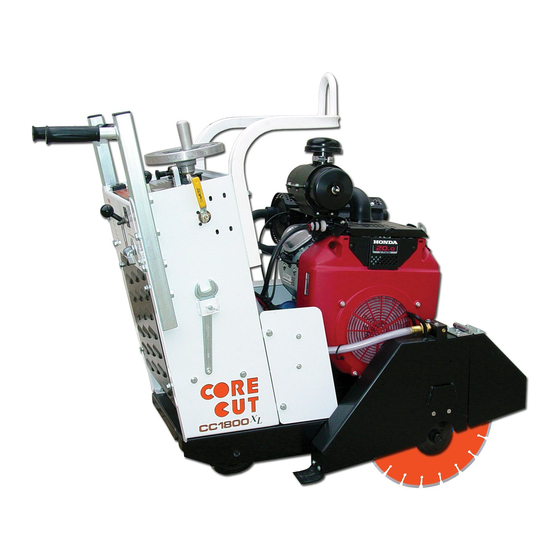Diamond Products CC1800XL Manuel de l'opérateur - Page 4
Parcourez en ligne ou téléchargez le pdf Manuel de l'opérateur pour {nom_de_la_catégorie} Diamond Products CC1800XL. Diamond Products CC1800XL 8 pages. Concrete saw

ASSEMBLY
1. Set handles to desired height and securely
tighten bolts.
and can be reversed, depending on operators
preference.
2. Be certain to check engine and transmission
oil levels and service if required.
engine manual for detailed information.
3. On electric saw models, the proper size power
cord must be provided by the purchaser.
GENERAL INSTRUCTIONS
1. Be certain you have the correct diamond or
abrasive blade.
servicing dealer for the correct specification.
Getting
the
tremendous difference in your blade costs and
performance.
2. The blade shaft flange and arbor must be
inspected for damage and cleaned before
mounting the blade. If damaged, replace bad
parts. Inspect blade for damage to arbor hole
and flange area before attempting to mount
blade.
3. Mount the blade solidly and firmly on the blade
shaft arbor using the wrench provided. The lock
pin(s) in the outer blade flange must go
completely through the blade and into the
matching hole(s) in the inside blade flange.
Tighten the blade flange bolt very securely
(Approximately 50 lb.ft.).
shaft bolt on the right hand side has left hand
threads, which tightens by turning counter
clockwise. The blade shaft bolt on the left hand
side has right hand threads, which tightened by
turning clockwise.
4. WARNING:
Do not operate without proper
blade guard in place. Do not operate with front
of blade guard raised. Blade exposure cannot
exceed 180 degrees when cutting.
5. The front pointer must be checked for alignment
with blade.
It must be in line with a blade
mounted shaft.
straight edge to verify alignment.
6. Do not use conventional (wet) diamond blades
without water! You must have from 2-1/2 to 5
gallons of water per minute flowing over the
blade for proper cooling and to get maximum
blade life. For wet sawing, are sure the spray
holes in the blade guard tubes are open and that
each side of the blade has an adequate supply
of water. Test your water supply for pressure
and flow before starting to saw.
7. Saw in a straight line.
clearly so the saw operator can follow the line
without difficulty. The saw should not be twisted
from side to side trying to force the blade back
on line.
CONCRETE SAW OPERATING INSTRUCTIONS
The handles are mirror image
Contact your authorized
correct
blade
will
Note that the blade
Use a chalk line or a long
Mark the cutting line
8. Saw only as deep as the specifications and job
Refer to
TO START SAW
1. Fill the fuel tank and check the engine oil level.
Refer to the engine manual for details.
disengage the transmission drive system before
starting the engine.
2. Start engine. Follow procedure in engine manual.
3. Let engine warm up at half throttle.
4. All sawing is done at full throttle. Governor is
make
a
factory set for correct engine speed.
TO STOP SAW
GAS SAWS: Push and hold down the stop button
at the right, center of the control panel until the
engine completely stops. If unit is key start, turn key
to OFF.
ELECTRIC SAWS:
starter box.
HYDRAULIC SAWS: Turn ball valve to off position.
TO MANEUVER SAW
1. Raise blade as high as possible so blade will not
2. To turn, lift rear wheels just above pavement
3. On
4. To push manually, the transmission must be
TO START SAWING
1. Align blade with cut.
2. For wet sawing open water valve Full open.
3. Lower blade into cut (never deeper than
conditions require. This will save blade life and
reduce sawing costs. Sawing excessively deep
is wasteful and should be avoided. Step cut in
increments of 2 inches for best results.
WARNING: On self-propelled models, always
Press stop button at top of
strike pavement when maneuvering. Pull index
plunger and turn handwheel counter clockwise.
and maneuver saw as desired.
Self-propelled
transmission by pushing the lever at the rear of
the control panel down.
disengage.
WARNING: Be certain the speed control lever
is at neutral before engaging to avoid sudden
movement.
control lever from the neutral position. This lever
permits infinitely variable ground speed (up to 70
feet per minute) in both forward and reverse.
When maneuvering with power, the engine
should be running at half throttle or more so the
hydrostatic transmission can operate efficiently.
For maximum speed forward or reverse, the
engine must be running at full throttle.
disengaged.
Confirm flow and adjust before lowering into cut.
If water supply is interrupted, stop cutting
immediately.
required)
by
slowly
units,
engage
the
Pull lever up to
Move the speed
turning
hand
wheel
